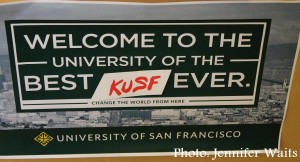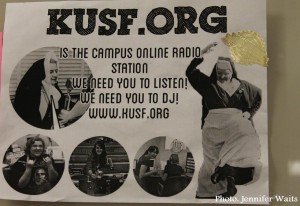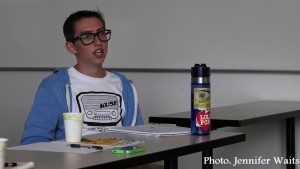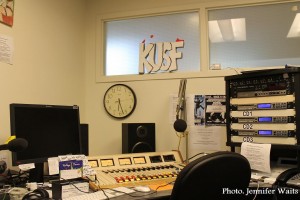On Tuesday night I attended a panel discussion at University of San Francisco (USF) on the topic of the past, present, and future of college radio station KUSF.
I’ve been closely following the trials and tribulations of the station since the shut-down of KUSF 90.3 FM on January 18, 2011. Two and a half years later, there’s a radically different KUSF.org on campus as well as community-led KUSF-in-Exile off-campus. The panel discussion was a great opportunity to learn some nuggets about the history of KUSF and gain some insight into where the online-only station is headed.
If you haven’t been following the KUSF saga as closely as I have, here’s a synopsis of the past few years. Up until January 18, 2011, KUSF aired a range of student and community programming on 90.3 FM (see my 2009 tour of the station on Spinning Indie). Unbeknownst to the station’s volunteers, license holder University of San Francisco entered into a deal with public radio group Classical Public Radio Network (CPRN) in order to sell the license. After locking volunteers out on January 18, 2011, the university began airing formerly commercial classical radio station KDFC over 90.3 FM. As part of this same deal, large commercial radio conglomerate Entercom off-loaded its KDFC brand to CPRN. Today Entercom airs a rock radio simulcast of KUFX on the former 102.1 FM home of KDFC.
After a drawn-out fight, CPRN eventually was granted the 90.3 FM license by the FCC in June, 2012. Now using the call letters KOSC, the former KUSF-FM is part of a Bay Area network of stations that plays classical music under the KDFC brand name. Back at USF, KUSF’s originally studios and offices were demolished and a small office and studio were built to house a new online-only radio station. Live DJs resumed broadcasting at KUSF.org in October, 2012. Former KUSF volunteers (including some students) have established their own radio station, KUSF-in-Exile, which operates from an off-campus studio in San Francisco’s Bayview District. Although the KUSF FM license sale was approved, the group Friends of KUSF and listener Ted Hudacko have been fighting this decision and have open appeals awaiting rulings by the FCC.
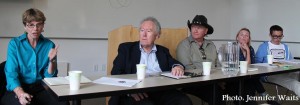
Dorothy Kidd, Steve Runyon, Damin Esper, Miranda Morris, and Alec Kaplan on KUSF panel (photo: J. Waits)
Tuesday’s panel featured people closely affiliated with KUSF, KUSF-in-Exile, and KUSF.org, making for an interesting look at how college radio has changed over the years at USF. I was perhaps most excited to hear some historical tidbits from KUSF General Manager Steve Runyon.
Runyon explained that student radio began at USF with a carrier current campus-only radio station. He said that students could hear the station by using radios in their dorm rooms. Runyon also recounted some lore that in those days the signal was rumored to have spilled over into a neighboring bus line (the Hayes Street bus), meaning that if you tuned into a transistor radio on the bus you could catch the sounds of the USF radio station. Carrier current wasn’t enough for USF students, so they were soon on a quest to find their own FM signal. Simpson Bible College (which owned KCMA 90.3 FM) approached the USF station to see if it was interested in purchasing the station. After purchasing the license and transmitter in 1973, KUSF eventually got on the air in 1977, initially broadcasting from 6pm to midnight.
Runyon, who was one of the founders of KUSF, said that the station went on to win numerous awards and “developed a world-class reputation,” with many KUSF alums going into the music business. During the panel discussion, the question was asked as to why KUSF was sold off if it had such an amazing reputation. Runyon said that the rationale that the university used was that that station wasn’t “serving the students.” He countered that argument by stating, “the irony is…[KUSF] always…had students.” Miranda Morris, KUSF.org’s Staff Coordinator nuanced that by saying, “students were definitely a low percentage” of KUSF volunteers when the station was shut down in 2011.
In addition to the low level of student involvement in the final years of KUSF 90.3 FM, there were several factors which may have resulted in the sale of the radio station. USF Professor Dorothy Kidd, who is also the current faculty advisor for KUSF, argued that the KUSF sale was about money, campus real estate, low student involvement, and the station’s lack of connection to an “institutional program definition” (KUSF wasn’t a program, for example). At a campus that was short on space, a multimillion dollar offer for the FM license was appealing to USF administrators.
The panel concluded with a discussion about the future of KUSF. Moderator Beth Hoffman, an Audio and Radio Production Professor at USF, asked, “is FM even necessary for today’s students?” Former KUSF volunteer Damin Esper (and current KUSF in Exile volunteer) pointed out that online radio has a very limited audience, with perhaps a dozen listeners at a time compared with the tens of thousands of listeners who tune in to FM. He said, “Broadcast radio still has a place.” With that in mind, KUSF in Exile is trying to return to the airwaves.
USF student and KUSF co-music director Alec Kaplan admitted that having “numbers at the end” of one’s call letters can give a radio station “credibility,” but he also said that it’s rare for his fellow students to tune in to terrestrial radio.
Kaplan said, “none of us drive cars” and pointed out that if KUSF.org’s goal is to reach students, then the station doesn’t need to be on FM. He said that the future of KUSF.org is up to the students and said that everyone at the station has a different goal for the station. Some have “artsy” aspirations, others just want to be heard by their parents, and some want to make money. Kaplan said that he’d like to work on a way for students to get academic credit for their work at the station, arguing that it would be an “incentive” for people to “work harder” to improve KUSF.
Morris said that KUSF.org is approaching its one-year anniversary and she said that there’s still a lot of work to be done, but that it was necessary over the past year to “reignite the campus station.”
Following the panel, I took a quick trip over to see KUSF.org. A DJ was arriving for his show just as I left, and it was reassuring to see an active radio station back on the USF campus. In the meantime, KUSF in Exile continues to broadcast off-campus, with dreams of getting back on FM in the future.

